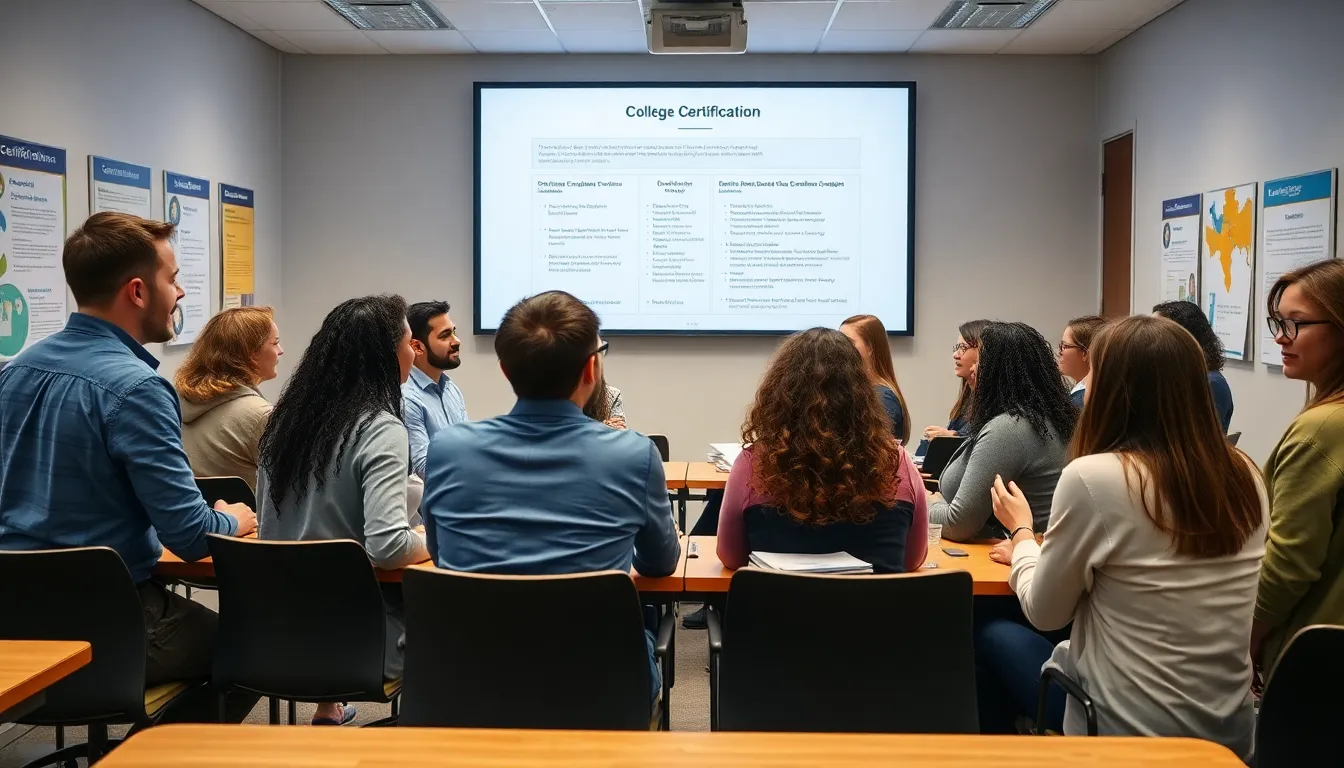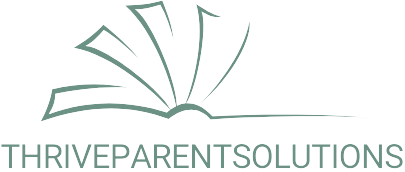In a world where degrees seem to multiply like rabbits, college certification stands out as the savvy choice for those looking to boost their credentials without the hefty price tag of a full degree. Imagine strutting into a job interview with a shiny certification that says, “I’m qualified, and I didn’t even need to survive on instant ramen for four years!”
Table of Contents
ToggleUnderstanding College Certification
College certification provides a practical pathway for individuals seeking to enhance their skills and marketability. This alternative to traditional degrees focuses on specific competencies that match industry demands.
Definition of College Certification
College certification refers to an official recognition awarded by educational institutions to individuals who complete a series of courses focused on specific fields or skills. Credentials like these confirm proficiency in areas such as healthcare, information technology, or business management. Certificates may vary in duration and complexity, ranging from a few weeks to several months. Many certifications require passing examinations that assess knowledge gained during the coursework.
Importance of College Certification
College certification holds significant value in today’s job market. Employers often seek candidates with specialized knowledge, and certifications demonstrate a commitment to professional development. Such credentials can distinguish applicants in competitive fields, enhancing employability. Statistics indicate that individuals with certifications can command higher salaries than those without. A specific certification may also lead to career advancement opportunities, validating expertise in a chosen area and increasing job security.
Types of College Certifications

College certifications come in various forms, catering to different professional and academic needs. Understanding these types helps individuals pursue the most suitable option for their career goals.
Professional Certifications
Professional certifications focus on specific job skills and industry standards. Fields such as healthcare, information technology, and project management often offer these certifications. Many employers prefer candidates with these credentials as they signify specialized knowledge. Obtaining a professional certification enhances job readiness and can lead to greater advancement opportunities. Moreover, these certifications frequently address current industry trends and practices, ensuring that candidates possess relevant skills.
Academic Certifications
Academic certifications involve coursework that aligns with specific academic programs. These certifications typically supplement degrees and provide focused knowledge in particular subjects. Colleges and universities award academic certifications in areas such as business, education, and the arts. Completing these programs demonstrates a commitment to further learning and can improve an individual’s marketability. Pursuing an academic certification may also facilitate pathways to advanced degrees or specialized training, expanding professional options.
The Process of Obtaining College Certification
Obtaining college certification involves several clear steps. Each step ensures that candidates meet necessary standards and gain valuable skills.
Enrollment Requirements
Different programs require specific enrollment criteria. Applicants generally must have a high school diploma or equivalent certification. Some fields may require prior coursework or industry experience. Educational institutions often request official transcripts during the application process. Additionally, certain certifications might necessitate entrance exams or background checks. Enrolling in a college certification program typically involves submitting an application and any required documents. Institutions evaluate these submissions to determine eligibility.
Completing Coursework
Coursework requirements vary by certification program. Programs include a series of classes that focus on essential skills and knowledge areas. Instructors often use a mix of lectures, hands-on training, and assessments to teach students. Candidates must complete all required courses to earn their certification. Many programs also involve capstone projects or practical experiences that demonstrate learned competencies. After finishing the coursework and meeting attendance requirements, individuals become eligible to receive their certification. This process ensures that graduates possess the necessary skills valued by employers.
Benefits of College Certification
College certification offers numerous advantages that enhance employability and professional growth.
Career Advancement Opportunities
Many employers prioritize candidates with college certifications due to their specialized knowledge. Individuals showcasing these qualifications often experience improved job prospects and more likely advance in their careers. Employers may promote staff who possess relevant certifications, recognizing their commitment to professional development. Statistics indicate that certified individuals often command higher salaries compared to those without certifications. A certification can serve as a differentiator in competitive job markets, leading to leadership roles in various sectors. Overall, earning a college certification can significantly elevate one’s career trajectory and open doors to new opportunities.
Skill Enhancement
College certifications offer structured programs that focus on relevant skills in specific fields. Engaging in such certifications allows individuals to deepen their expertise and remain competitive in the job market. Many courses emphasize hands-on training and practical applications, ensuring graduates are job-ready. Participants frequently acquire up-to-date knowledge that aligns with industry trends. Confidence often grows as skills are enhanced through these focused studies. By targeting key competencies, individuals can position themselves as valuable assets to potential employers, ultimately boosting their marketability.
Challenges in Achieving College Certification
Achieving college certification presents several challenges that candidates must navigate. These obstacles can impact the possibility of earning valuable credentials.
Time and Financial Considerations
Time constraints often limit the ability of individuals to pursue college certification. Many programs require significant commitments of hours each week. Financial factors also play a critical role; program costs may include tuition, materials, and potential lost income from reduced working hours. For example, some certifications can range from $500 to several thousand dollars, depending on the field. Individuals need to budget effectively to cover these expenses while maintaining their financial stability. Scholarships and financial aid might not be widely available for certification programs, adding another layer of difficulty.
Balancing Work and Study
Balancing work and study obligations often proves challenging for those pursuing college certification. Many candidates work full-time jobs, which can limit their flexible study time. Those with family responsibilities may find it even harder to dedicate time to coursework. Online formats provide one solution, allowing students to learn at their own pace. Additionally, part-time programs accommodate busy schedules, enabling individuals to manage work commitments alongside their studies. Prioritizing time becomes essential, as completing the required coursework while meeting job responsibilities can lead to stress and fatigue.
College certification stands out as a strategic choice for individuals aiming to enhance their career prospects. By focusing on specific skills and competencies, these certifications provide a clear pathway to increased employability and professional growth. They serve as a testament to an individual’s commitment to continuous learning and adaptability in a rapidly changing job market.
Despite the challenges that come with pursuing certification, the benefits often outweigh the obstacles. With the right approach and dedication, candidates can unlock new opportunities that lead to higher salaries and career advancement. In today’s competitive landscape, college certification can be the key to standing out and achieving professional success.





